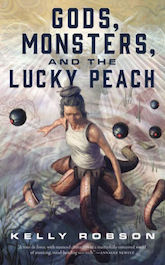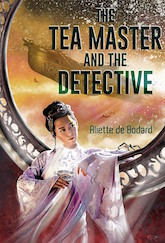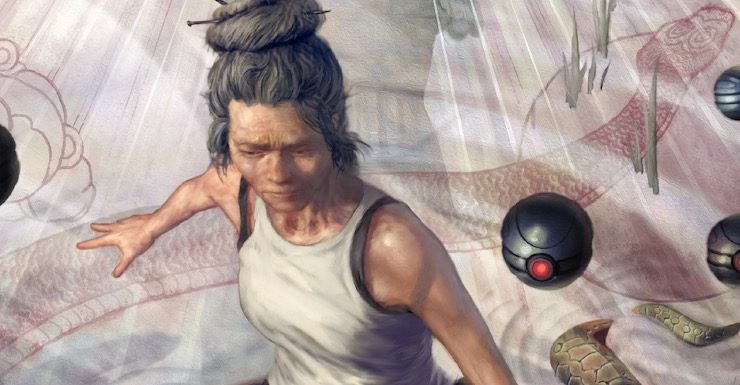The difference between a really good novella and an excellent one lies partly in the ability of the author to make the ending feel right, inevitable, and a satisfactory conclusion to all that has come before. There are other differences (and some of these are also differences between a good novella and a bad one, depending on how they arise), and this statement is also true for a lot of novellas. But if there’s a difference between Kelly Robson’s really good Gods, Monsters, and the Lucky Peach (Tor.com Publishing) and Aliette de Bodard’s excellent The Tea Master and the Detective (Subterranean Press), it’s that Robson’s ending feels right and inevitable, but not satisfactory, while de Bodard’s ticks all three boxes.
Buy the Book


Gods, Monsters, and the Lucky Peach
Gods, Monsters, and the Lucky Peach is a time travel narrative, one that uses sly sleight of hand to tell two stories in parallel. One of these stories is told in a linear fashion, but this is time travel—the other story, much brief than the main narrative, isn’t linear at all. Not when you really look at it.
This is the story of king Shulgi, around 2000BC in Mesopotamia, who finds strange signs and omens—and odd-shaped murderous demons—afflicting his people and his kingdom. He’s also engaged in a power-struggle with the priestess of the moon, Susa, who says that the signs mean that the gods want Shulgi to die.
The other strand of the story starts in 2267, after an ecological collapse. Minh’s a plague baby, part of the generation that first moved back up to the earth’s surface from the underground hells in order to reclaim humanity’s ancestral habitat. Minh restores ecosystems for a living, a career that requires the ability to think long-term. Funding for the long-term has dried up since the discovery of time travel.
When she and her team—Kiki, a young woman so desperate to do meaningful work that she engages in extreme body-modification in order to secure her place on the team; and Hamid, a man of Minh’s generation who specialises in animals and is passionate about horses—win a bid to survey the Tigris and Euphrates river basins in 2000 BC, Minh comes face-to-face with the epitome of short-term thinking in their time-travel specialist, Fabian, and is forced to confront the ways in which she, too, has failed to really think about the future and the needs of the younger generation. Things come to a head in a manner driven by the different moral imperatives of Fabian and Kiki, exacerbated by Minh’s short-sightedness.
Gods, Monsters, and the Lucky Peach is a tight, atmospheric novella that evokes a world very different from the present, but one filled with people who’re still recognisably very like us—both in the past and the future. But it ends on an open question, leaving a great deal unresolved. While some narratives don’t suffer when they end without emotional closure, I feel that in this case, on balance, Robson’s thematic arguments grow murky at their conclusion. What question are we supposed to ask? Or to answer? Much is only implied which might have benefited from rendered in slightly more explicit strokes.
Buy the Book


The Tea Master and the Detective
De Bodard’s The Tea Master and the Detective is a science-fictional ode to Arthur Conan Doyle’s Sherlock Holmes, where the Holmes figure is a sharp and biting disgraced aristocratic scholar with a solid core of empathy, and the Watson-figure is a mindship with post-traumatic stress disorder from her war experiences.
The Shadow’s Child is a mindship, a former military transport discharged from service after a traumatic incident left her temporarily trapped in the deep spaces with her whole crew dead. She’s now intensely avoidant of the deep spaces, which only mindships can navigate without harm, and this means that she can’t earn her living in the usual mindship way, by transporting people. Instead, she’s a “brewer of serenity”—someone who brews mind-altering drugs to improve the comfort and safety of people who travel, or work, in space—but this isn’t a very lucrative career. When eccentric and abrasive consulting detective Long Chau walks into her office looking for a drug to keep her sharp in the deep spaces, The Shadow’s Child‘s budget means she can’t afford to turn down the job. But her ethics means she won’t let someone else supervise Long Chau’s reaction to the drug and deep spaces in combination. Even if that means facing some of her fears. When, together, they find a corpse in the deep spaces that may have been murdered, Long Chau’s ethics get The Shadow’s Child involved in the investigation.
But The Shadow’s Child is also investigating the mysterious Long Chau and her own murky, deliberately-obscured past. Long Chau has secrets. What she discovers troubles The Shadow’s Child immensely, just as the investigation is coming to a head. The Shadow’s Child has choices to make, and those choices will bring her face-to-face with her greatest fears.
This is a measured, almost stately story, right up until a conclusion that explodes in fast-paced tension. It preserves the empathy and the intensity of the original Sherlockian stories, while being told in de Bodard’s sharp prose and modern style. The worldbuilding—this novella is set in de Bodard’s Xuya continuity, like On A Red Station, Drifting and The Citadel of Weeping Pearls—sparkles. The characters have presence: they’re individual and compelling. And it ends it a way that recalls the original Holmes and Watson, while being perfectly appropriate to itself.
I recommend both these novellas strongly, by the way. Just because I think one works better than the other at the end is no reason not to enjoy both!
Liz Bourke is a cranky queer person who reads books. She holds a Ph.D in Classics from Trinity College, Dublin. Her first book, Sleeping With Monsters, a collection of reviews and criticism, is out now from Aqueduct Press. Find her at her blog, where she’s been known to talk about even more books thanks to her Patreon supporters. Or find her at her Twitter. She supports the work of the Irish Refugee Council and the Abortion Rights Campaign.











$40 for a hardcover novella? It’s only 96 pages. That seems like a lot.
Subterranean makes fancy paper books designed for collectors. They’ll release an ebook eventually.
Now if you want to talk ridiculous prices, try tor.com’s $10 for an ebook novella…